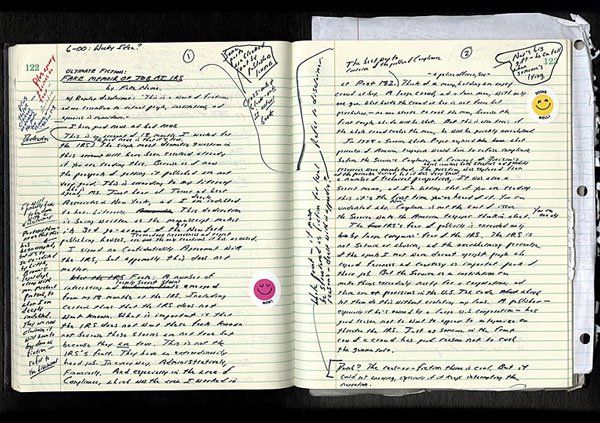 To admit to keeping a journal might smack of a twee sensibility, but I’ve kept one for years, and find them rather to be a necessity. These journals have long given way from their original, possibly naval gazing intent, which was to chronicle the days, and have become more useful for literary digressions, and a regular and deliberate writing about writing.
To admit to keeping a journal might smack of a twee sensibility, but I’ve kept one for years, and find them rather to be a necessity. These journals have long given way from their original, possibly naval gazing intent, which was to chronicle the days, and have become more useful for literary digressions, and a regular and deliberate writing about writing.
After the intense work of my MFA in 2006, I was writing a lot about process in my journal. While pursuing my degree I was writing in multiple directions creatively, and these experiments led to inquiries and writings on craft. Perhaps because in its normal guise this writing is known as criticism, it has a negative connotation for creative writers. But writing about writing seems to jiggle synapses, opening up my creativity. The beauty of writing about process is that the writing itself is often the process.
A journal, it seems, is the perfect vehicle for exploring topics in a blog. Thus, I naturally turned to writing a blog.
I’ve now written my blog for the last seven years–eleven years, if you count the one that preceded it but which I quit a few years in to go to grad school–and I’ve kept journals for much longer than that. In that time, I’ve written over 100 blog posts, most having to do with some aspect of writing and craft. Much like the critical work of my MFA, writing my blog has kept me within arm’s reach of that academic world–or at least, feeling as if I am still in the conversation.
During the AWP Conference in Minneapolis this year, Charles Baxter led a panel, “The Art of the Art of Writing,” for a discussion based on his Graywolf Press series, and it was the first seminar where I found myself writing down much of what was said. As Baxter said, “Criticism is/can be, an art.” To further make this type of writing palatable, Stacey D’Erasmo, one of the panelists, offered, “Criticism is thought, not judgment.” I was also pleasantly surprised to see this wasn’t a jam packed seminar–it was late afternoon when blood sugar levels drop–which gave me solace in that it’s one area where I don’t have to feel competitive. Writing fiction, sometimes, can feel like a competition; whereas writing criticism can be an opportunity to slow down, and to ruminate.
Maintaining a blog about writing is a great habit for writing fiction no less, and I can’t complain about writer’s block; I simply have to find the time to put in some writing, and invariably the ideas begin to flow. I actually don’t believe in writer’s block; Flaubert’s marinating is the occasion for me to write something different.
It may at first seem an odd preoccupation for a self described fiction writer to always return to writing about writing. But as I also review books, which is another form of writing about writing, the end result is a deeper appreciation and understanding–and excitement about–the process of writing. Blog writing occupies the logical part of my brain, leaving the dreamy and surreal side to flourish for my fiction.
Aware of the social network savvy-ness of blog culture, I have infrequently written a blog post hoping to garner hits. I long ago gave up trying to second guess that algorithm and instead have focused on pieces that have interested me, mainly. It’s a surprise usually to see which posts get the most hits. I would be curious to discover the site linked to my piece about short story openings–my single most read post.
I also, contrary to the prevailing wisdom, blog at a snail’s pace. I’ve never seen my blog merely as a place to post bite-sized morsels every week, though expediency has led me to these occasionally. If anything, the blog has become a practice for writing longer pieces. I’ve written a few posts that cracked 2000 words, but for the most part I’ve managed to keep them within 1000 words. I’m sure every writer has their sweet spot in a blog post, and I find 1000 words to be the perfect capsule for many of the topics I’ve written on–it almost subconsciously works out this way. Of course, these topics can be explored in longer essays, but the blog has an immediacy that lends itself to trying a subject out. I’m especially fond of E. M. Forster’s statement, “How do I know what I think until I see what I say?”
There’s no shortage of topics to consider, either, with the irreversible and remarkable changes in publishing over the past decade, or wide-ranging discussions of industry trends, or reviewing un-put-downable fiction. There are a number of think piece type blogs which have been resources for me, and have been models for posts I might write. The more involved with literary matters the better. (The Los Angeles Review of Books, Tim Parks’s blog at the New York Review of Books, The Smart Set, and Arts and Letters Daily are several I check regularly.) In fact, when I first began my blog, I was always surprised–and pleased–to find blogs with a similar sensibility. I couldn’t imagine this bounty if the internet didn’t exist.
In reading other writer’s blogs, I have discovered a diasporic community. So I have reached out–and been reached out to–by a number of interesting bloggers, who are all fascinating to me in their unique approaches to the medium (So many have come and gone over the years, I resist naming any here). This has led to requests for guest blog postings, and one for a serial interview when I published my novel last autumn. Though I may never meet these fellow bloggers in person, it’s been great to know we are connected in a kindred medium and subject.
Finally, one of the great rewards of this practice is that it has given me a log of my thinking over the years, a timeline in a body of work that parallels my creative output, since I’ve also been publishing fiction and reviews regularly when I can. It’s surprising to look back over the years and re-read a piece I wrote about daily writing habits, or a deconstruction on David Shields’s death warrant for the novel, or an essay attempting to describe Gary Lutz’s sentences. Having become something more than the sum of its parts, I often think that my blog is a book. One day it may very well become that.








